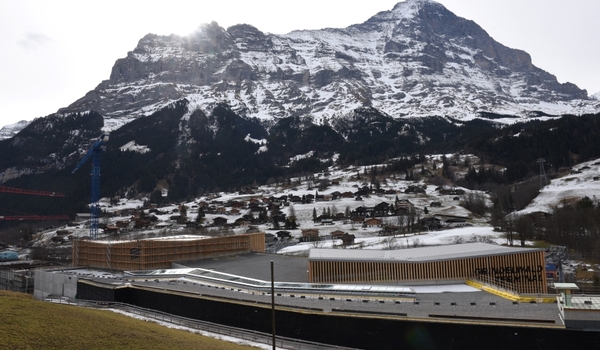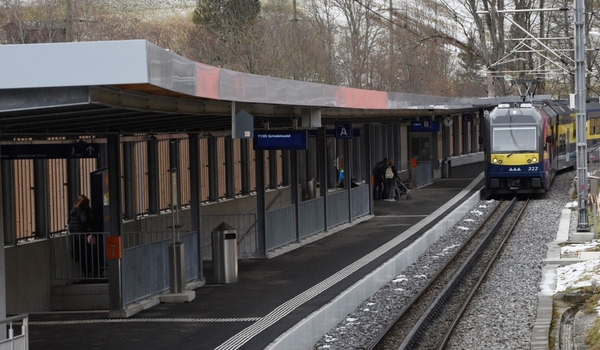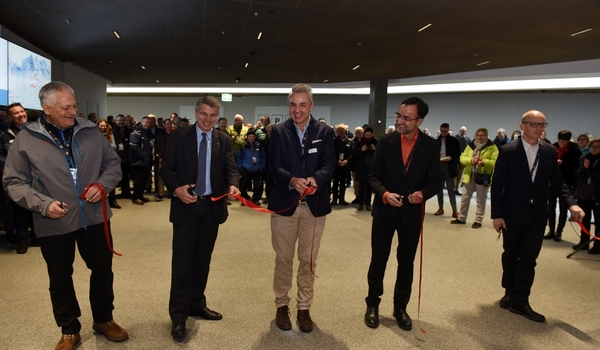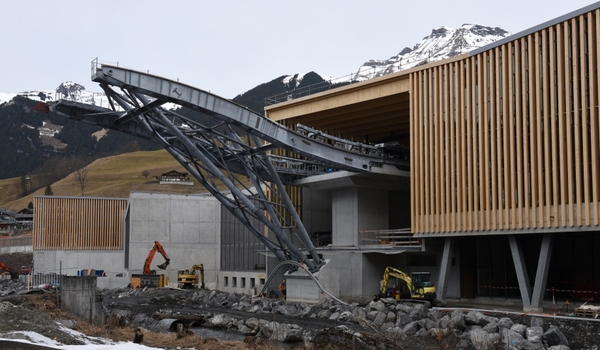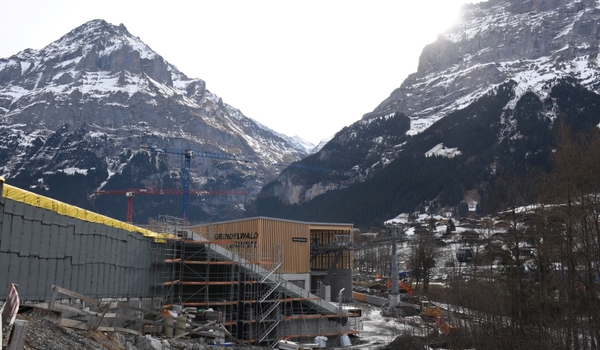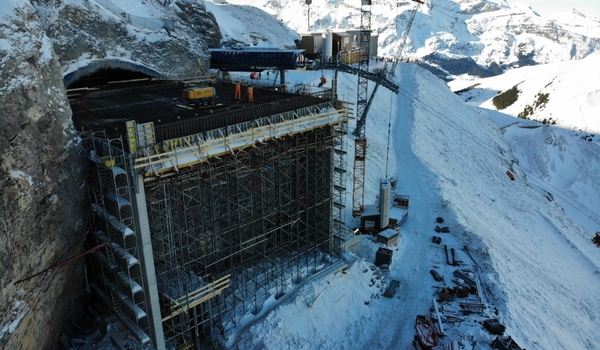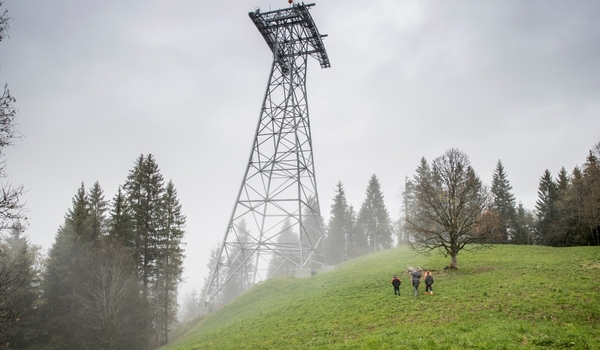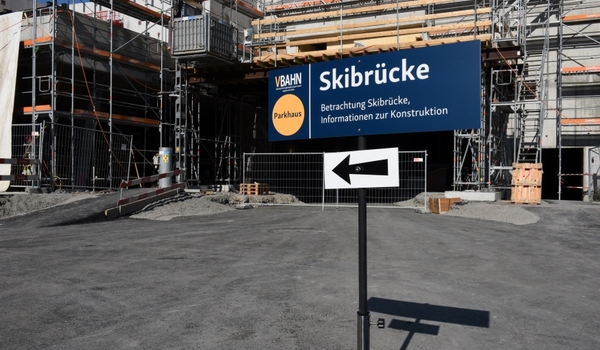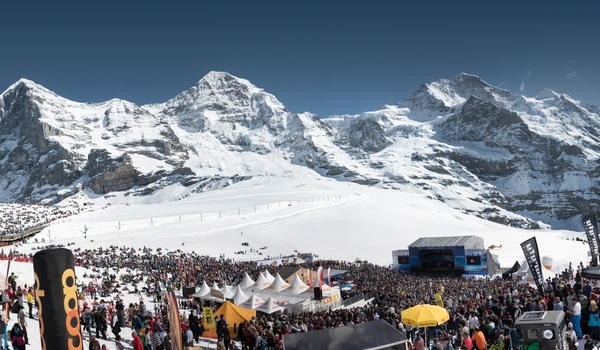Welcoming address to the shareholders
Dear Shareholders
Jungfrau Railways has had another successful year. Demand for our products and services has continued to rise and we have taken advantage of the opportunities in the market with pleasing results: the Group achieved its highest ever revenue from transport. The V-Cableway is being built in parallel with the high season. This is our most spectacular project since the construction of the Jungfrau Railway Tunnel over a hundred years ago. The Jungfrau Railway Group has a CHF 320 million share of the total investment volume of CHF 470 million. Our staff, on-site workers and engineers and site management are able to cope with these major challenges. With the opening of the new Männlichen Railway on 13 December 2019, another major milestone in the project was reached.
Prof. Dr. Thomas Bieger, Chairman of the Board of Directors and Urs Kessler, Chief Executive Officer
The pleasing sales resulted in an impressive new record profit of CHF 53.3 million. The high cash flows enabled us to again avoid taking out loans for the V-Cableway in 2019. The Groups self-financing level will remain high even after the completion of intensive construction activities. This helps to reduce economic risks and strengthen independence, which is important for our company in view of the volatility of tourism.
At present, we are having to deal with the effects of the Coronavirus (COVID-19) which, having started in China, has now developed into a pandemic. We have responded to the decline in reservations in international group travel segment of our business with cost-cutting measures. We have taken the opportunity to review our cost structures once again. In terms of market development, we are reacting with agility and at short notice through additional sales efforts and by offering products in alternative markets. On 14 March 2020, the ski area and the cogwheel railways above Grindelwald and Wengen, namely the Jungfrau Railway, were officially closed. They remain closed at the time of publication of this management report. We must assume that the results for 2020 will be significantly down on the previous year.
We will continue to maintain a presence in the regions affected by the virus. We must not forget that those mainly affected by the events will be particularly hard hit by the health and economic consequences and may suffer personally. This is why Jungfrau Railways employees maintain their contacts even in difficult times. They empathise and offer goodwill help in coping with the effects on our business relationship. Especially in Asian regions, this behaviour is highly appreciated and contributes significantly to good long-term customer loyalty.
As mentioned, the 2019 financial year was very successful. We set new sales records on the Jungfrau Railway, the Harder Railway, the Mürren Railway and the First Railway, and once again, more than one million guests visited Jungfraujoch – Top of Europe. In the Jungfraujoch – Top of Europe segment, this resulted in a net transport revenue of CHF 120.9 million with a 2.7% higher average yield per guest. In winter sports, the reversal trend of recent years was continued. Just in time for the start of the new V-Cableway era, we were able to continue the success of the first decade of the present century with 1,069,500 guest admissions.
For many years we have been discussing at this juncture our V-Cableway project, which is now becoming reality. We have reported on progress and setbacks, on the completion of sub-projects and last year on the start of construction in Grindelwald and on the Eigergletscher (municipality of Lauterbrunnen) for the centrepiece with its new cable cars, the railway station, the terminal and the multi-storey car park. With the investments in these new facilities and in the existing cogwheel railways, we can for future generations position Jungfraujoch – Top of Europe and its surroundings as one of the most important mountain railway attractions and as the most sought-after tourism and leisure brand worldwide. Last year’s highlight was the on-time operational launch of parts of the terminal in Grindelwald Grund for our partner companies: since 14 December 2019, Berner Oberland-Bahnen AG’s trains have been stopping at the new station and Gondelbahn Grindelwald-Männlichen AG opened its new facility to the public on the same day. Although we are a few weeks behind schedule due to the harsh weather conditions on the Eigergletscher, it is as of today still our aim to open the entire V-Cableway terminal, with shops, restaurants and other services, the spectacular Eiger Express 3S Cableway and the new multi-storey car park with 1000 spaces on 12 December 2020. We will then have a tourist hub like no other in the Alps. The Top of Europe brand will be strengthened and guests will experience real added value.
The V-Cableway will strengthen the competitiveness of the region and thus provide income for the local population. It will enable us to counteract the negative side-effects of the large number of visitors in the high season in the long term. We offer our guests more space, pleasant visitor guidance and a better quality travel experience overall. The active and digitally supported guest management will be time-saving and convenient. The railways will be able to actively reduce mass gatherings and congestion and make the best possible use of existing capacities. Optimum utilisation of the means of transport opens up prospects for an acceptable increase in the annual number of visitors. We will counteract the overloading of the environment and the resulting loss of quality for guests by limiting the number of daily visitors – and we will try to do the same in the case of winter sports. A positive factor for the environment is also that the V-Cableway will promote the use of public transport by connecting to the railway network. We are underlining our commitment to Lauterbrunnen and Grindelwald with a sustainability fund which will be activated at the time of the opening of the entire V-Cableway. Complementary to the management report and to our figures, we are demonstrating our commitment to corporate social responsibility (CSR) in our online annual report with three reports on selected CSR topics. We show how we behave in relation to nature, operate from generation to generation and sustainably anchor ourselves in the region. In our annual report, we express our joy at and anticipation of the opening of the V-Cableway through the photomontages and visualisations in our annual report.
While we are pleased to be able to use the once-in-a-generation V-Cableway project to sustainably develop the region and Jungfrau Railways, thus benefiting future generations, it is also important to prepare the company for the time after operational launch. In line with our vision of an integrated tourism company, we will offer visitors a holistic experience consisting of nature, outdoor activities, shopping, gastronomy and rail travel. With the reduced journey times on the new V-Cableway, our guests will have more time for other leisure activities. In addition, the financial targets will be adjusted following this major investment. Development of the organisation will continue and the Executive Board will be broadened. As a result, once the V-Cableway is operational on 1 January 2021, the heads of the main departments will be represented on the Executive Board. The Executive Board will now comprise six instead of three members. In this way, we ensure the continuation of efficient, decisive management. We are happy to be able to fill all positions with internal candidates thanks to long-term personnel planning. The Board of Directors is also concerned with succession planning, and for this purpose it will be strengthened by the election of Heinz Karrer.
We have already experienced on several past occasions that the worldwide sale of tourism products and services can sometimes encounter unexpected obstacles. Terror attacks, political turmoil or economic turbulence affect the behaviour of international customers. Within the industry, price wars – primarily in China – continue to be relentless. As already mentioned, we remain concerned about the Coronavirus (COVID-19), but we are not fundamentally pessimistic. At the time of publishing this management report, the consequences of the now-worldwide coronavirus crisis cannot be fully assessed. However, we do not consider the impact on our business figures to be long-term. On the contrary – we can rely on our good infrastructure, our firm foothold in the international markets, our solid financing and our current innovations, and look to the future with confidence. You will find more on this in the message from our company management.
We thank our employees for their outstanding performance once again and their daily, genuine hospitality towards our customers. We also thank our customers, the federal and cantonal authorities, the municipalities, the mountain communities, the tourism organisations, the neighbouring railways, the resellers, the suppliers, the International High-Altitude Research Station Foundation and all the other partners such as the hotel industry, with whom we cultivate a fruitful partnership. Finally, we would like to thank you, dear shareholders, for your trust in our Group and the loyalty you have shown to Jungfraubahn Holding AG.
|
|
|
|
Prof. Dr. Thomas Bieger |
Urs Kessler |
Jungfraubahn Holding AG in Brief
Activities of the Jungfrau Railway Group
The Jungfrau Railway Group is a leading tourism company and the largest mountain railway company in Switzerland. The most important offering is the journey on the spectacular railway to Jungfraujoch – Top of Europe, 3,454 metres above sea level. In the Asian markets, the development of the first distribution and agency network has helped it to achieve a leading position when it comes to visiting the glacier world of the Alps. The Jungfrau Railway Group also operates other mountain railways on well-known Experience Mountains in the Jungfrau region, winter sports facilities, a hydroelectric power station. Along the tourism value chain, it operates restaurants, shops and parking facilities.
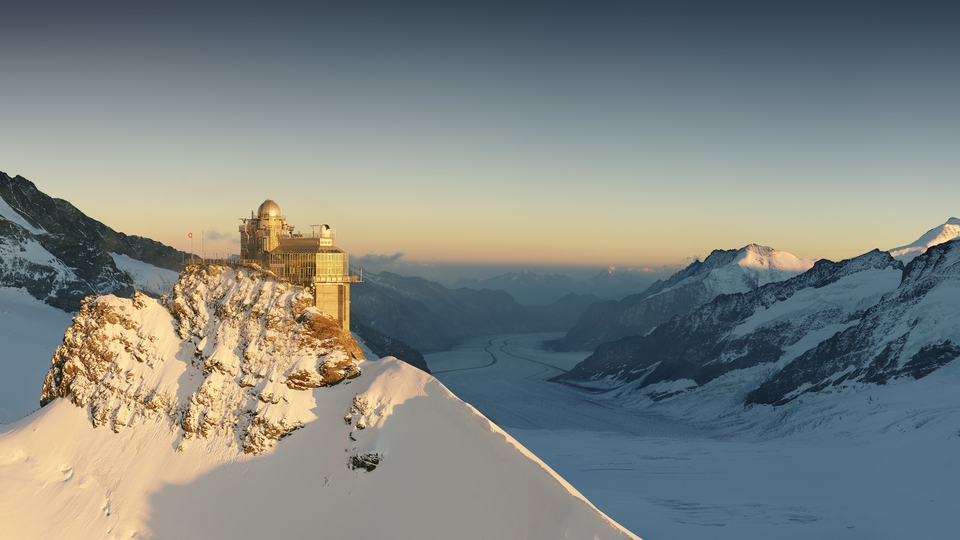
Sphinx und Aletsch Glacier
Focus on the customer is an element of sustainable orientation above all other guiding principles. The Group thus achieves an attractive positioning on the market for tourists and investors. We are an important factor in the regional economy. In cooperation with other tourism companies, we promote the further development of the Jungfrau Region.
Operating Income
Operating Result (EBIT)
Annual profit
Number of personnel
Goals of the Jungfrau Railway Group
As a leading tourism company in Switzerland and the largest mountain railway group, the Jungfrau Railway Group is developing as an integrated leisure and service company. At the same time, it focuses on:
- Its entrepreneurial tradition of more than 120 years
- The vision of its founder to make the unique Alpine landscape accessible to the wider population and international tourists
- Its sound foundation in the Jungfrau Region
- Its brand and excellence in service and technology, developed over generations
It is the driving force behind the economic development of the Jungfrau Region and alpine tourism in Switzerland. It thus makes a significant contribution to the strengthening of this region. It takes into account the interests of the local population, encourages its employees, and looks after nature – an important resource for the development of the region and for Jungfrau Railways. It should be preserved and kept accessible to future generations in keeping with the founder’s vision. A prerequisite for this is to maintain economic independence and increase attractiveness for investors. The Jungfrau Railway Group attaches great importance to sustainability. In connection with the construction of the V-Cableway, a plan for increased protection of nature in the directly affected areas (including Itramenwald, Grindelwald) is being implemented and monitoring is being carried out in collaboration with the management of UNESCO World Heritage Site Swiss Alps Jungfrau-Aletsch. Jungfrau Railways is backing up its commitment to Lauterbrunnen and Grindelwald with a sustainability fund, which will be set up at the time of opening of the entire V-Cableway. The preparations for this are largely complete. The fund will be launched and become effective from 2021.
The objective is to strengthen Jungfraujoch – Top of Europe as the main source of revenue. Internal growth will be targeted through better utilisation of the off-season and off-peak times, a moderate increase in transport capacities, and through the integration of further services such as shopping, catering and soft adventure in the adventure chain. The V-Cableway project with the two new cableways and other integrated components (rolling stock renewals, public transport connection, multi-storey car park, slope construction and, in particular, a unique terminal) will secure a successful tourist future for the entire Jungfrau region in the medium and long term as an outstanding year-round destination for Swiss tourism. It is primarily by shortening travel times and increasing travel comfort that the project strengthens the competitiveness of the Jungfraujoch as a world-famous beacon, while also helping the winter sports destination reach the top position in international competition.
The strategic financial objectives of the Group are based on long-term goals and the policy of a value-based company (value stock). The key factors determining the Group’s financial planning are targets geared to profitability (including return on sales) and strong self-financing. You will find the corresponding figures in our Financial Report . The financial targets were re-adjusted by the Board of Directors for the time with the V-Cableway. We explain the reasons for this in the Management Message.
Business Segments of the Jungfrau Railway Group
Jungfraujoch – Top of Europe
Jungfraujoch – Top of Europe is the Group’s most profitable segment. At core of this segment is the highest railway station in Europe at 3,454 metres above sea level, situated within the UNESCO World Heritage Site Swiss Alps Jungfrau-Aletsch. Commercial exploitation of the Wengernalp Railway and Jungfrau Railway excursions to Jungfraujoch – Top of Europe is at the strategic heart of the company. In 2019, with 1,056,000 guests, the magic mark of one million visitors was exceeded for the fourth time.
Jungfraujoch visitors
Winter Sports
The winter sports facilities in the Kleine Scheidegg-Männlichen, Grindelwald-First and Mürren-Schilthorn areas are part of the Jungfrau Ski Region subscriber association, in which the Jungfrau Railway Group holds a share of over 60 per cent via the facilities it owns and operates. Together with the partner companies, the Group manages one of the most important ski resorts in Switzerland on behalf of the association.
Jungfrau Ski Region guest visits
Experience Mountains
The Experience Mountains segment includes the excursion destinations around Jungfraujoch – Top of Europe, Grindelwald-First – Top of Adventure, Harder Kulm – Top of Interlaken and Winteregg-Mürren – Top of Family. These excursion destinations enhance the regional experience and allow for interesting combinations such as holiday passes and cross-marketing. The railway from Grütschalp to Mürren will be completely renewed between 2019 and 2024 (investment of about CHF 50 million).
Turnover by Segment
The amount of net sales provides information on the size of the business segments. “Other segments” comprise a wide range of services that support the business of the main segments internally and are also used by external customers. These include, for example, Jungfraubahnen Management AG, the power plant and the multi-storey car park in Lauterbrunnen. The following compilation also includes the internal Group eliminations.
The Holding Company

Organisation
The Board of Directors of Jungfraubahn Holding AG is the Group’s top decision-making body. It is responsible for strategic planning for the entire Group and executes this within the scope of its legal and actual possibilities within its subsidiaries. The Executive Board of the Jungfrau Railways Group is appointed in accordance with the provisions of the Board of Directors of Jungfraubahn Holding AG and within a framework approved by the General Meeting of Jungfraubahn Holding AG for total remuneration by Jungfraubahnen Management AG. The information on staffing of the executive bodies was updated as at 31 December 2019. Please find details and information on changes during the 2019 reporting year in the chapter Special (Personnel and Recognition) and the Corporate Governance Report.

In 2019, planning began for a reorganisation of Jungfrau Railways for the period after the opening of the V-Cableway. In this direction, a departure from the matrix organisation (segments/specialist areas) will be pursued. At the end of the year, it was decided to increase the number of members of the Executive Board and to involve the specialist departments to a greater degree. Corresponding elections were held with a view to reorganising the company. The structure, which will be prepared in 2020 and finally introduced when the new Executive Board assumes responsibility on 1 January 2021, looks as follows according to the current state of planning:

Key figures of the consolidated financial statements
| CHF (thousands) | 2019 | 2018 | Change in per cent |
|---|---|---|---|
| Operating income | 223,310 | 212,815 | 4.9% |
| Transportation revenues | 161,807 | 153,833 | 5.2% |
| EBITDA | 102,958 | 95,111 | 8.3% |
| EBITDA in % of operating income | 46.1% | 44.7% | 3.1% |
| EBIT | 67,504 | 60,969 | 10.7% |
| EBIT in % of operating income | 30.2% | 28.6% | 5.6% |
| Annual profit | 53,344 | 47,826 | 11.5% |
| Return on sales (ROS) | 23.9% | 22.5% | 6.2% |
| Free cash flow | -21,511 | 16,305 | -231.9% |
| Equity ratio | 79.0% | 79.7% | -0.9% |
| Headcount (full-time positions) | 612 | 600 | 2.0% |
Jungfraubahn Holding AG (parent company)
Jungfraubahn Holding AG is a holding company. Its business model is defined by fiscal and financial policy considerations. The most important part the a profit plan is the financial statement. This includes the dividend payments for the subsidiaries and the internal interest income.
The income from investments in 2019 amounts to CHF 17.0 million. The loans to the subsidiaries of CHF 155.6 million are interest-bearing. Together with the remaining financial income and after offsetting financial expenses, the financial statement closes at CHF 17.8 million. Earnings amount to CHF 17.0 million. The detailed financial statements with appendix can be found after the consolidated financial statements in the financial report. They are part of the request for authorisation made at the 2020 Annual General Meeting.
Jungfrau Railways
The subsidiaries of Jungfraubahn Holding AG (JBH) cooperate closely with Berner Oberland-Bahnen AG (BOB). The partnership is managed by Jungfraubahnen Management AG (shares: JBH 67 per cent, BOB 33 per cent). The management company provides the Executive Board elected by Jungfraubahn Holding AG with a management infrastructure, including personnel (managers, specialists), that is suitable for managing the Jungfrau Railway Group and successfully fulfilling management mandates for other related companies (e.g. Jungfrau Ski Region). BOB has also transferred its management to Jungfraubahnen Management AG on a mandate basis. This mandate is conducted with due regard to the interests of BOB and its independence in accordance with the stipulations of the BOB Board of Directors and the provisions of the organisational regulations of Berner Oberland-Bahnen BOB.
The joint operation benefits from the best possible utilisation of the management resources (personnel, skills, tools) that the management company establishes, maintains and develops for all its clients. Insofar as it coordinates its approach with clients in order to strive for the greatest possible synergies, particularly in marketing, customer service, insurance, quality assurance, compliance management, procurement and IT, it does so as a full-function joint venture of the companies involved. Collectively, the companies involved act under the name Jungfraubahnen (Jungfrau Railways) and under the registered trade mark Jungfrau – Top of Europe.

Message from Company Management
Opportunities and Risks
On 1 August 1912, the highest railway station in Europe was opened on the Jungfraujoch, at 3,454 metres above sea level and in the middle of the unique mountain world of the Eiger, Mönch and Jungfrau. This record still stands today and is one of the reasons why a trip on the Jungfrau Railway is one of the great tourist attractions of the Alps. The eventful construction history surrounding the railway pioneer Adolf Guyer-Zeller strengthens its worldwide renown. The Jungfraujoch – Top of Europe brand is thus established both nationally and internationally. Jungfrau Railway frequencies are growing disproportionately in comparison with hotel overnight stays in Switzerland. 2019 was the fourth year in which over one million guests travelled to Jungfraujoch.
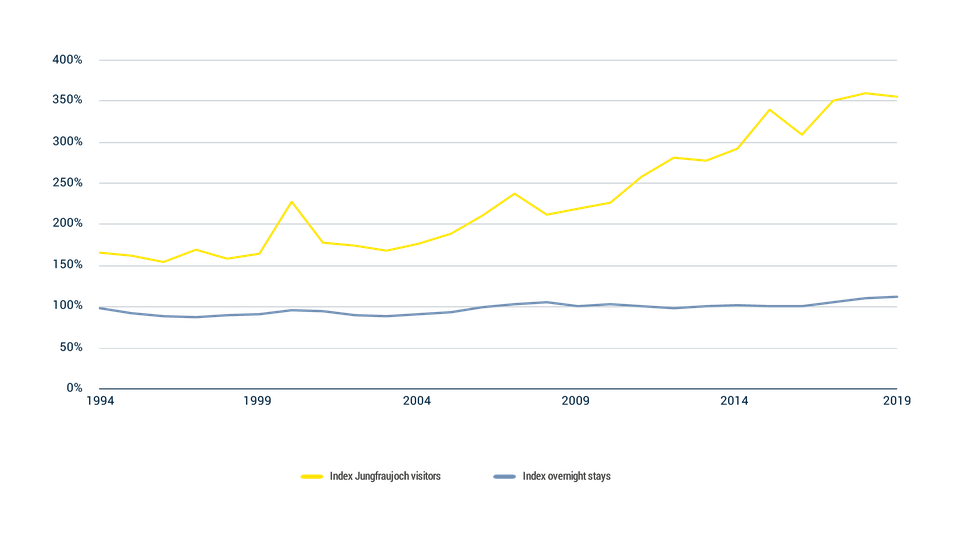
Benchmark for Jungfraujoch visitors and overnight stays for Switzerland indexed
As a pioneer on the Asian markets, the Jungfrau Railway Group recognised the potential of Asia decades ago. The entire Jungfrau Region also benefited from this. A particular strength is the variety of products and services in a very small space. With the Experience Mountains, the complementary segment in the summer business, customers on low budgets can be targeted and excursions to the Jungfraujoch can be complemented in a worthwhile way as part of an extended stay (cross-marketing). With its winter sports segment, Jungfrau Railways has an important foothold in Switzerland, neighbouring countries, the Benelux countries and the UK The Experience Mountains also achieved record results in 2019, which is attributable to a significant increase in demand among young international guests and families from all over the world. By designing the experience to include low-level adventure products, providing special outdoor adventure trails that can, for example, be accessed easily and do not require any special physical abilities, a special vantage platform or an attractive playground, it is possible to meet the expectations of these guests. At the centre of our efforts are always our employees, who are committed to operating, maintaining and cleaning the facilities on a daily basis. They welcome our guests, provide information and instructions and help in emergencies. As courteous hosts, they are a walking advertisement for our company.
We must meet the high expectations placed on our company without playing a part in harming the environment. Due to its global importance, this is an obligatory risk factor for all companies. In this context, we see the new V-Cableway as an opportunity: in the future, we will be able to offer passengers improved travelling comfort, with less time needed and more flexibility in terms of route selection. This will lead to more individualised and flexible travel behaviour on the part of visitors and therefore open up new possibilities for smart passenger guidance. Overcrowding and traffic jams will be reduced and capacities better utilised. Better utilisation of transport opens up the prospect of increasing the annual number of visitors without straining the natural limits of sustainable use of the environment. A positive factor for future generations will also be that the V-Cableway will promote the use of public transport by connecting up with the railway network.
The time required and time lost is an important quality factor in the modern tourism industry. Adventure seekers appreciate long transfers with no entertainment value as little as skiers appreciate long queues at the bottom of a ski lift taking up a valuable part of their day’s skiing. Speed, capacities and optimum utilisation are therefore among the production factors that have represented a weakness of the mountain railways since its early days. The Jungfrau Railway Group is paying particular attention to this area. Ongoing improvements have been achieved, for example through more powerful traction units, track upgrades and a reservation system. A further improvement in comfort and therefore reduction in travel time is expected with the completion of the V-Cableway at the end of 2020. This major project will secure the successful future of tourism in the medium to long term throughout the entire Jungfrau Region as a vital year-round destination for Swiss tourism, thus providing income for the local population.
In our risk analysis, the opportunities and promising potentials contrast with the risks typical of the tourism business: tourist demand is subject to currency fluctuations, geopolitical security concerns, health/pandemics, and the threat of terrorism. Long-lasting bad weather and major storms diminish turnover, whereas good weather periods increase it.
At the beginning of 2020 we are confronted with a unique situation. The fight against coronavirus illness has brought our business to a virtual standstill for the time being. Currently, all tourist facilities and especially the Jungfrau Railway have been closed on the basis of the new ordinance from the Federal Council. This results in a risk situation that is reflected in our portfolio. Our risk management system addresses this situation in several ways: low debt and outsourcing reduce fixed costs and enable a quick and efficient response on the expenditure side. By diversifying our markets, we have opened up alternative possibilities. As digitalisation progresses, our agility in terms of both product offerings and pricing has increased. Digitalised communication and distribution allow for the rapid implementation of immediately initiated marketing measures. A high quality of service, loyalty in relations with tour operators and agencies – even in difficult times – and consistent nurturing and strengthening of the brand are highly important factors in being able to return quickly to a market affected by a crisis.
Structural Stability, Brand Management and Partnerships
To protect itself against the volatility of the tourism industry, Jungfraubahn Holding AG has developed particular strengths: the basis of this is a high level of self-financing at 79.0 per cent. The financing of the ongoing major investments in the V-Cableway is structured and planned in such a way that the interest-bearing liabilities will reach a maximum of 10 per cent. Stability is also guaranteed by the broad base in three different segments. The portfolio is structured in such a way that the diversified businesses mutually support each other.
Our representatives in various Asian metropolises support our contacts and the distribution of Jungfraubahn Railways. They are supported by a skilled sales team and by personal sales trips by the CEO. The agencies ensure that our products are included in tour operator programmes and in brochures. To exploit the potential demand, the Jungfrau Railway Group has developed brand management and distribution via tour operators into a core competence. The jungfrau.ch website invites users to dream and plan. It is aimed at individual travellers who want to book their holidays and excursions directly online, and at potential group travellers who will enquire about the Jungfraujoch – Top of Europe at their travel agency. Due to the fact that more and more people are travelling individually, global online sales are gaining in importance.
Awareness of the Jungfraujoch continues to be promoted by prominent guests. In 2019, handball player Andy Schmid, Swiss star player from the German Bundesliga, paid a visit to the glacier world. Staged presentation of such appearences, this time with an international handball match between Switzerland and Korea, gives rise to stories that are told all over the world and ensure a corresponding media presence. Visits by delegations familiarising themselves with the Jungfrau Region for travel reporting or to prepare travel arrangements (“familiarisation trips”, or fam-trips for short) are encouraged, being supervised and supported by the Jungfrau Railways sales team on a daily basis. Strengthening our reputation also includes cooperation with important partners in the industry such as Switzerland Tourism, BE! Tourismus AG, Jungfrau Region Tourismus AG and Interlaken Tourismus (TOI) alongside industrial and commercial players such as the Swatch Group, Coop, ABB and Lindt & Sprüngli.
Integrated Leisure and Service Company
The demand for tourist services that offer a great variety of experiences in the shortest possible time is growing. Therefore, integration of the service chain is becoming more important. The coordinated services and ordering processes make planning and organising a holiday trip considerably easier for both the tour operator and the individual traveller. Combined offers and packages allow for attractive offers and prices. An integrated company can fully exploit the potential of the customers it has acquired. It can ensure customer satisfaction more independently and optimise customer benefits more effectively through a specially defined quality standard.
The Jungfrau Railway Group is very well positioned to offer comprehensive leisure experiences thanks to its various segments, the diversity of the Experience Mountains it has opened up, and its growing integration. It closes gaps in integration by cooperating with efficient partners in the region. From the outset, online sales was designed with integration in mind. The individual elements of a holiday trip can be combined in the shopping cart and booked in one step.
Restaurant and catering operations will be increasingly integrated in the Jungfraujoch – Top of Europe business segment. Instead of self-employed entrepreneurs who rent the restaurants from Jungfrau Railways, a newly founded subsidiary is taking over the catering businesses. On Kleine Scheidegg, the changeover was completed at the end of 2017, and on the Jungfraujoch at the end of the 2019 summer season. In the V-Cableway terminal, a logistically optimally located central kitchen is being built to increase catering efficiency in the area of our main business. Integrated gastronomy can be seamlessly incorporated into the sales system. Table reservations and aperitifs will be ordered together with the train journey. Based on the One Journey – One Ticket slogan, the IT vision behind this is the digitalised integration of all services that the customer uses on their journey.
A further focus is on shopping, which is already an integral part of the Group’s offering. This expands the presence along the tourist axes and the tourist hot spots, and the range is also increased. The Top of Europe – Flagship Store was created in a central location in Interlaken. Here, too, integration has opened up new prospects: our Rail Info service, an important point of sale that was previously operated at this location, is now embedded in a large, lively and entertaining shopping world.
Motor of Tourism Development (Sustainability)
Our business models are geared towards the needs of a national and international clientele searching for a unique mountain experience. Thanks to our unique appeal, we are perceived as a rewarding travel destination. Only by being socially embedded in the region can we meet the expectations of this clientele. As an integrated and partnership-based company, the Jungfrau Railway Group is an important driver of economic development in the region. It makes a significant contribution to the strengthening of the Jungfrau Region. In doing so, it takes into account the interests of the local population, encourages its employees and looks after nature, which is an important resource for the tourism industry. The regional value cycles are kept in motion by Jungfrau Railways’ value generation. They offer promotion and development opportunities for most of the approximately 1,000 employees.
Nature should be preserved and made accessible to future generations in keeping with the Jungfraubahn founder’s vision. This is also how we also understand and fulfil the obligations we have undertaken for the V-Cableway project. These go beyond the legally prescribed replacement measures: we will better integrate the Strättli galleries of the Wengernalp Railway into the natural surroundings, beautify the townscape on Kleine Scheidegg, actively manage the sustainability fund for the communities of Grindelwald and Lauterbrunnen, and protect fauna and flora around the V-Cableway (Itramenwald).
The stakeholder approach of the Jungfrau Railway Group will serve as a veritable engine for tourism development: the activity of Jungfrau Railways helps to strengthen retail, trade, agriculture and local infrastructure, and it establishes a basis upon which the hotel industry can continuously renew itself. This has a positive effect on the attractiveness of the overall offering and thus on the international appeal of the Jungfrau Region. This creates potential demand from which the Jungfrau Railway Group creates value, which in turn strengthens its local roots through consolidated partnerships, taxes, wage payments and investments.
Objectives, Expectations and Metrics
The focus of our objectives is always on securing the success of the Jungfraujoch business segment – the region’s main attraction and the Group’s highest-margin segment. The Board of Directors has set itself the goal of maintaining the high frequencies in the peak season for the longer term and increasing average yields in moderate steps.
The embedding in the protected mountain world and the technical conditions in the mountains set natural limits to growth in terms of frequencies. There is still potential for growth by improving utilisation of existing infrastructure in the off-season. This goal is summed up by CEO Urs Kessler in the 12-Month Peak Season slogan. The Firstbahn, for example, now runs for eleven months of the year. However, our focus is fundamentally not on volume, but rather on profitability and brand strength. With regard to the guests’ willingness to buy and pay, this always means quality before quantity. The 2.7 percent increase in average yield per transported guest in 2019 in the Jungfraujoch – Top of Europe segment shows that the many small steps towards improvement are having a positive effect.
With the completion of the V-Cableway, the quality of our products and services in the main segment will increase dramatically. It is therefore not surprising that the declared primary goal for the current year is to complete this project successfully, on time, and without accidents. In 2021, we will then complete the necessary final work and focus on reviewing and optimising the new operating procedures and adapted processes. With the V-Cableway, the changes will be so striking that it is a case of a new era for Jungfrau Railways. We will also supporting this change as of 1 January 2021 by reorganising and strengthening the Executive Board, on which the specialist divisions will also be represented. With the V-Cableway, we will be able to aim for a return to the Champions League of winter sports. However, this will only be possible in cooperation with the entire region, which has to keep pace with the quality of the hotel industry in particular. Under our own steam, we want to once again reach the highest visitor numbers of the previous decade. This is the basis for the premium section of the infrastructure after the construction of the V-Cableway. That is why we are already talking about limiting the daily number of visitors on the few peak weekends. The development potentials for winter holidays and for stays of several days will not be not affected by this.
In future, we will also respond to seasonal differences in demand with adjusted tariffs. Transparency and traceability in pricing are important to us. Different prices for different periods meet these criteria. We are continuing to develop the online sales system with the aim of opening up the possibilities of the huge diversity of devices and multimedia services. In doing so, we use new sales channels and successful platforms. We configure our central sales system in such a way that it can cope with the diversity of today’s customer interfaces and digitally support internal processes (such as product and service design, reservations, scheduling and billing). With its digitalisation, Jungfrau Railways is increasing its market presence and the efficiency of its processes. In 2020, the system will be optimised for the integration of the new V-Cableway.
When assessing the achievement of the objectives, the traffic revenues of the railways and the revenues of the ancillary businesses are important parameters. The average revenue per visitor and the utilisation of resources can be calculated based on the reported frequencies and the seat kilometres produced. The Board of Directors measures the success of the strategies and operational objectives by means of selected key financial figures. It adjusts them only very cautiously for reasons of reporting continuity. For the time with the V-Cableway (from 2021), however, it believes the time has come to bring the financial figures into line with the major developments of recent years and with the renovations. The targets will be raised and the equity ratio replaced by the level of external debt – which is ultimately the issue due to our risk exposure (see above). Higher expectations will be placed on profitability (return on sales).
Special
Shareholder Loyalty
The shares of Jungfraubahn Holding AG are listed on the SIX Swiss Reporting Standard (JFN ISIN CH0017875789). Issued certificates are replaced by value rights upon delivery. No new share certificates will be issued.
In 2019, shareholders were able to visit the Jungfraujoch at a special price of CHF 50 from either Lauterbrunnen or Grindelwald. A total of 1,680 shareholders took advantage of this offer and enjoyed the majestic backdrop of ice, snow and rock with breath-taking views.
In 2020 the offer consists of visiting one of the three Experience Mountains at a special price. There is a choice of the Harder Kulm – Top of Interlaken, First – Top of Adventure or Winteregg – Top of Family. This provides an opportunity to see how the Experience Mountains are constantly developing with new offers. The annual shareholder offer is not a natural dividend. Jungfrau Railways also sees its shareholders as ambassadors. They are encouraged to get to know their company from the customer’s point of view.
A shareholder club has been established for all shareholders holding 250 shares or more. Anyone entered in the Jungfraubahn Holding AG share register with at least 250 shares on the cut-off date (next date: 1 October 2020) becomes a member automatically. The great confidence of our shareholders in our company is to be rewarded with special prices, which will be announced online.
Shareholder structure (quantity)

Shareholder structure (share of capital)

V-Cableway
To capitalise on the potential demand, price levels and costs must be kept low. Only in this way can the positive operating results be achieved and the desired cash flows generated. These can be reinvested to strengthen the company and distributed as value stock. The funds targeted at enhancing attractiveness and productivity create a cycle that increases the company’s value in terms of future earnings potential. One outstanding project in this context, in which a considerable amount of self-generated funds are used to increase profitability, is the V-Cableway. It is a joint venture of Jungfraubahn AG, Wengernalpbahn AG, Gondelbahn Grindelwald-Männlichen AG, Berner Oberland-Bahnen AG and Grindelwald Grund Infrastruktur AG. The planned investment volume for the entire project amounts to CHF 470 million (Jungfrau Railway Group CHF 320 million).
The investment allows for faster and more comfortable travel while simultaneously reducing maintenance and operating costs per passenger. With the opening of the cableway, the connecting trains to the Jungfraujoch will operate in a simpler circulation, reducing amount of the rolling stock required and the number of trips by 25 per cent. The existing infrastructure will be relieved of daily peaks and intersecting streams of visitors, especially on Kleine Scheidegg. The result is a gain in convenience and daily output without any fundamental adjustments to the historically developed bodies of the Kleine Scheidegg or Jungfraujoch. Following the start of construction of the terminal, railway station, multi-storey car park and cable cars to the Männlichen and Eigergletscher in June 2018, major progress was made on all construction sites in the 2019 reporting year.
Terminal
2019 was dominated by concrete work, which was completed at Grindelwald Grund by the time of partial operational launch in December 2019. The interior work in the terminal building was also completed in time for the partial opening of the new 10-passenger Grindelwald-Männlichen (GGM) aerial gondola. The new Grindelwald Terminal station of the Bernese Oberland Railway provides a direct connection to public transport.
At the beginning of May 2019, the new substation of the Berner Kraftwerke (BKW) was connected to the Grindelwald power grid and the old station was taken off the grid.
Steel and wooden supporting structures were erected around the valley stations of the two new tracks. Assembly of the new ski bridge was completed in November 2019. This was already in operation in the 2019-2020 winter season as access from the replacement parking spaces and the ski slope.
Berner Oberland-Bahnen AG’s Railway Station Grindelwald Terminal
The construction work and the installation of the technical equipment were completed on schedule. In addition to access to the terminal, the public road from Kantonsstrasse at the Rothenegg roundabout has also been put into operation. Completion work on the surrounding area will take place in spring 2020.
On 13 December 2019, the new 10-seater Grindelwald-Männlichen aerial gondola and Bernese Oberland Railway’s new Grindelwald Terminal station celebrated their opening. Since the following day, guests have been able to travel by public transport and have a direct connection to the Männlichenbahn. This shortens journeys by eleven minutes (journey time now being 19 minutes). The partial opening of the terminal also gave guests an initial foretaste of the planned grand opening on 12 December 2020. The cash desk area, the toilet facilities in the terminal, the accesses to the north section and the offices and staff rooms of Grindelwald Grund Infrastruktur AG and Gondelbahn Grindelwald-Männlichen AG were put into operation.
Multi-Storey Car Park
Construction of the five-storey car park began in early summer 2019. The excavation work was completed on schedule in the autumn and the concrete carcass work in level -4 was completed over the entire area. On the west side of the car park, part of the work on walls and ceilings of levels -3 and -2 has already been completed. After completion on 12 December 2020, the multi-storey car park will have 1,000 parking spaces.
Eigergletscher
The rock removal and excavation work was completed on schedule thanks to winter construction measures that were launched, meaning that concrete work could begin in April 2019 in accordance with the construction programme. By the end of the year, a good 9,000m3 of concrete had been used on the Eigergletscher. Despite difficult weather conditions, the concrete work at the Eigergletscher station was completed in spring 2020, meaning that interior construction work could begin. Due to the storm winds at the end of 2019 and the beginning of 2020, structural work on the Eiger Express mountain station has been delayed by several weeks. However, acceleration measures and selective shift work will make up the shortfall in the coming months.
In the 2019 reporting year, 43,384 tons of material, equivalent to 3,944 freight trains, were transported by rail to the construction site on the Eigergletscher and to the transhipment point on the Salzegg. Thanks to this transport method, the number of truck journeys and helicopter flights has been minimised. The transport cableway from the transhipment point on the Salzegg to the Eigergletscher, specially installed for the construction of the V-Cableway, also had a positive effect.
3S Route and Pistes
The delivery of all suspension and haulage ropes for the Eiger Express to Grindelwald was carried out in the second half of 2019 by means of several heavy transports. Work on the Eiger Express rope hoist will start at the end of April 2020.
The new blue run above the Fallboden Gallery was opened for winter sports operations in time for the 2019-2020 winter season. Completion work and the merger with the piste from the Eigergletscher will follow in summer 2020.
Publicity and Public Information Activities
The website www.jungfrau.ch/v-bahn contains the latest information on the project status. Local people are informed about the state of construction by monthly gazette advertisements.
The construction site tours were very popular, with around 100 tours being offered in the reporting year 2019. There was also a construction site open day in Grindelwald Grund.
Outlook
Work on the once-in-a-generation project will continue apace in 2020. The construction of the multi-storey car park and the interior finishing of the terminal will continue. Once the concrete work on the Eigergletscher is complete, the interior work and installation of the cable car technology will continue. The cable pull for the new 3S cableway will start at the end of April 2020. On the Eigergletscher, work is due to be carried out on tracks 1 and 2 and the tunnel portal extension of the Jungfrau Railway.
As of today work is on schedule, meaning that on 12 December 2020 the entire terminal and its shops, bistro and production kitchen, the new 3S cableway Eiger Express and the multi-storey car park can be handed over to our guests for use.
SnowpenAir, 4 April 1998 until 4-5 April 2020
To increase the capacity utilisation of the entire Jungfrau Region in spring and to gain new customers, the first SnowpenAir concert took place on 4 April 1998 at Kleine Scheidegg. For 23 years since then, 200 tons of material have been transported to Kleine Scheidegg every spring – without the use of a helicopter. Four of the 23 concerts were two days long and attracted up to 10,000 visitors per day. Unfortunately, while completely booked out for both days, the concerts on 4 and 5 April 2020 had to be cancelled due to the measures to contain the coronavirus (COVID-19).
Beside great international artists like Bryan Adams, Joe Cocker, Status Quo, Amy Macdonald and Zucchero, Swiss acts have also played at every concert. The artists were enthusiastic about the unique scenery and the very special ambience in the snow. “It’s the most beautiful place I’ve ever played” – fantastic feedback from Jenes, a member of Joe Cocker’s band.
Due to an agreement with an immediate neighbour, we will have to forego holding this event in the future. This marks the end of an era that has gone down in the history of Jungfrau Railways. To our great regret, as this special highlight had positively influenced its reputation throughout Switzerland for many years. SnowpenAir is inseparably connected with our CEO Urs Kessler, who as head of marketing initiated it, built it up and turned it into a top event. SnowpenAir has always been very close to his heart – even after his election as CEO. He deserves our recognition for this – congratulations and many thanks!
Personnel and recognition
Board of Directors and Executive Board
The Chairman, the five members of the Board of Directors and the composition of the Remuneration Committee were confirmed by the 2019 General Meeting.
Since June 2017, the Executive Board has consisted of three members: Urs Kessler, CEO, Christoph Seiler, CFO, and Christoph Schläppi, Corporate Secretary.
Personal information on the Board of Directors and Executive Board and their remuneration can be found in the Remuneration Report and in the Corporate Governance Section of this Annual Report.
Management of Operational Units
The activity of the three business fields is described in the main workflow management processes. Several specialist and support departments help deliver value creation in the business segments. The major value-creation processes, i.e. the business segments, will be assigned a management role in the organisational structure chart (as at 31 December 2019):
- Markus Balmer, Top of Europe Business Segment
- Marco Luggen, Experience Mountains and Winter Sport Segments
- Thomas Aebischer, Berner Oberland-Bahnen Business Segment (partner company)
The segment managers in the organisation matrix have the role of ordering the services of the specialist and support departments. These are managed by the following executives (as at 31 December 2019):
- Markus Balmer, Technology
- Matthias Bütler, Marketing
- Dominik Liener, Infrastructure
- Reto Mettler, Gastronomy
- Andreas Piattini, Human Resources (until 29 February 2020)
- Christoph Seiler, Finance
- Urs Siegenthaler, IT
- Stefan Würgler, Operations
The present operational structure will remain in place until 31 December 2020. The Jungfrau Railway Group is reorganising itself from 1 January 2021. The Executive Board will also be restructured and enlarged accordingly. Christoph Schläppi is retiring and his successor will no longer be represented on the Executive Board. However, she or he will attend the meetings as secretary. The additional members of the new Executive Board have already all been recruited internally (Matthias Bütler, Dominik Liener, Marco Luggen and Stefan Würgler). The business segment management role and the job title Member of the Extended Executive Board will be abolished. The current business segment managers and the members of the extended Executive Board will continue to perform key management functions within the company. Some of them will take up new challenges.
Patrizia Bickel
As Head of Corporate Communications, Patrizia Bickel oversaw Jungfrau Railways’ appearance in the media for seven years. She assumed the role of media officer for Jungfrau Railways on 1 January 2013 – just a few weeks after the introduction of the V-Cableway project. She supervised this one-in-a-century project through several years of political debate, witnessing the lengthy negotiations with the landowners and the objection procedures. The unfailingly efficient preparation of the media work, her precision in creating public information plans and her clear expression in press releases and oral statements were of the greatest value in this very important campaign. She also managed the UNESCO dossier on the V-Cableway and the establishment of the V-Cableway Corporate Social Responsibility Fund. Her successful work for the V-Cableway is a shining example and representative of many other projects, incidents and events which where she was on hand in the media with great professionalism. The Board of Directors, CEO and management would like to thank her for her great dedication, personal commitment and the excellence of her direct, personal support – often in difficult situations and under great time pressure. At the beginning of 2020, she resigned from the Extended Executive Board. Jungfrau Railways considers itself fortunate that after the birth of her son and reduction of her workload, Patricia Bickel will continue to support the management in another role.
Andreas Piattini
Andreas Piattini was appointed Head of Human Resources on 1 May 2017. He left Jungfrau Railways at the end of February 2020 to take up a new challenge. In a short space of time, he greatly modernised the HR department of Jungfrau Railways and introduced a process and quality-oriented working method. With the HR Suite, a package of updated and new HR tools, he also initiated the systematic digitalisation of the division. In addition to these organisational measures, Andreas Piattini has always sought and maintained direct contact with employees and managers. He was often to be found in the front office and always had an open ear for the special concerns of the staff. He has played a very positive role in the development of the company’s human resources strategy. For example, transparent salary policy and systematic talent promotion were two of his personal concerns. The Board of Directors and the Executive Board thank him for his commitment. He has achieved a lot in just a few years. This is the result of his strong bond with the company and his model commitment.


